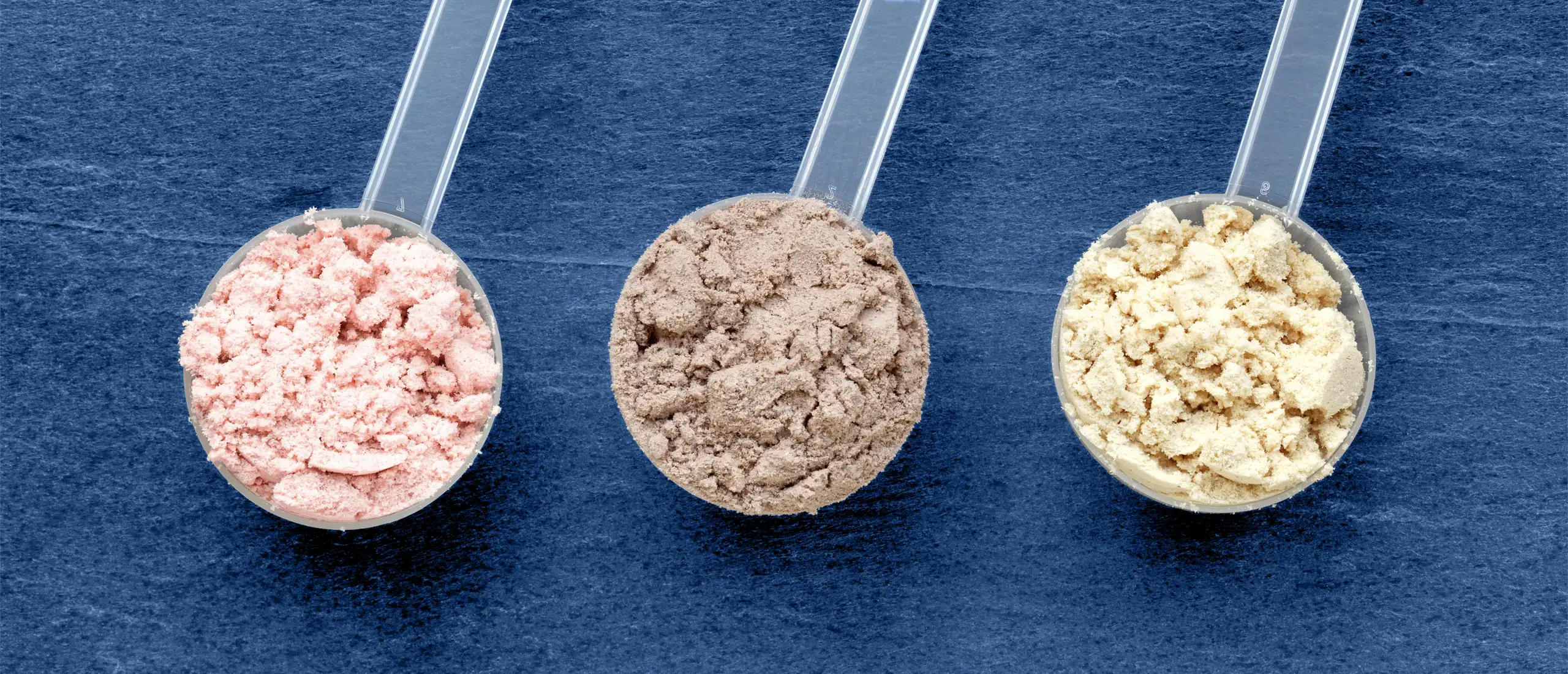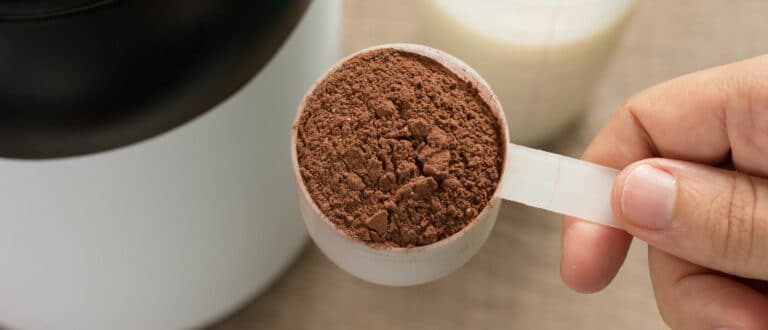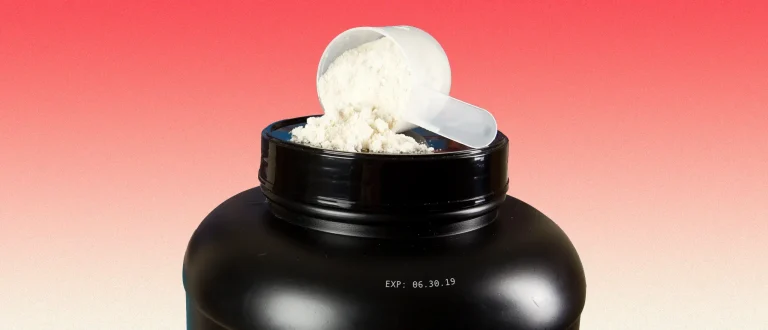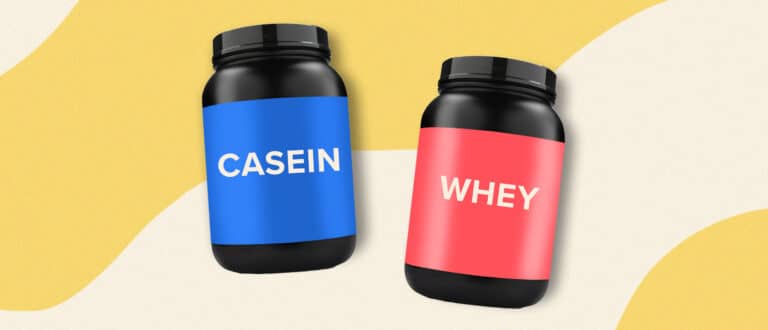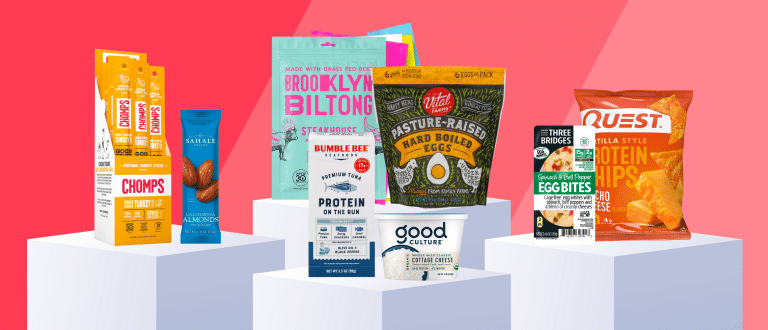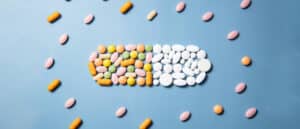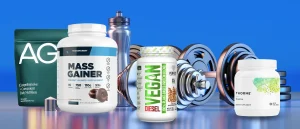10 Best Low-Calorie Protein Powders for Weight Loss, Lean Muscle Gain, and More
- By Sydney Bueckert, NASM C.P.T., C.E.S., F.N.S., G.P.T.S.
- March 27, 2024
Our product recommendations are selected by editors, tested first-hand, or expert-approved. We may earn a commission through links on our site.
Calories aren’t the end-all-be-all of good nutrition; but, if you’re cutting or trying to lose weight, maintaining a calorie deficit can help (1). If you only pay attention to calories, however, you might be losing more than fat. Weight loss often results in the loss of both fat and muscle mass (2). Increasing your protein intake can help protect and maintain muscle, particularly in a calorie deficit. That’s where a low-calorie protein powder can help.
“Low-calorie protein powder packs a good amount of protein while minimizing calories. It may help promote weight loss while preserving lean body mass, so long as it’s consumed within the context of a balanced diet and mild to moderate daily caloric deficit,” explains registered dietitian Imashi Fernando, M.S., R.D. C.D.C.E.S.
What’s the best low-calorie protein powder? Here’s the scoop.
About the Expert
Imashi Fernando, M.S., R.D., C.D.C.E.S. is a registered dietitian who works in a large hospital system as a clinical dietitian and provides one-on-one nutrition counseling through her virtual private practice, Brown Sugar Nutrition PLLC.
Why You Should Trust Us
Hone Health is a team of health-obsessed journalists, editors, fitness junkies, medical reviewers, and product testers. Before writing this low-calorie protein powder guide, we spoke with registered dietitians to figure out exactly what to look for (and avoid) in a protein powder supplement.
We selected products that met the specific R.D. guidelines laid out at the bottom of this article—only including protein powders that have been third-party tested (or show proof of internal testing), have 150 calories or less, contain no added sugars, and minimize added ingredients. Our top picks have 20 to 30 grams of protein, but a few on this list have less because they were otherwise the best options available.
The 10 Best Low-Calorie Protein Powders
Everyone’s fitness goals, dietary preferences, and restrictions are different—which is why we’ve rounded up the most popular low-calorie protein powders by type of protein, lowest calorie, highest protein, and more. Plus, we’ve spelled out the benefits of each to make your choice as simple as possible.
Don’t have time to dig through the full list? We got you. Here are our top picks:
- Best Overall: NOW Sports Whey Protein Isolate ($72)
- Best Low-Calorie Whey Protein Powder: Thorne Whey Protein Isolate ($62)
- Best High-Protein Whey Protein Powder: Transparent Labs Whey Isolate ($60)
- Best Third-Party Tested Whey Protein Powder: Momentous Whey Protein Isolate ($58)
- Best Low-Calorie Casein Protein Powder: NOW Sports Micellar Casein ($33)
- Best High-Protein Casein Protein Powder: Transparent Labs Casein ($60)
- Best Low-Calorie Egg White Protein Powder: NOW Sports Egg White Protein ($26)
- Best High-Protein Egg White Protein Powder: Naked Egg White Protein Powder ($68)
- Best Low-Calorie Plant-Based Protein Powder: Perfect Sports Vegan Protein Powder ($36)
What Makes a Protein Powder Low Calorie?
The lowest calorie protein powders emphasize protein and minimize other ingredients like carbohydrates, fats, added sugars, artificial flavorings, and other additives which add additional calories to a protein powder. The lowest calorie whey protein is whey protein isolate—which involves additional processing that results in higher protein content and less carbs, fat, and lactose than whey protein concentrate.
However, it also depends on the actual amount of protein per serving. One gram of protein contains four calories. So, protein powders that have a higher protein concentration will naturally have more calories. More protein in a protein powder isn’t a bad thing, especially if your goal is to take in more protein. Most people shouldn’t turn away more protein for the sake of a few extra calories. But, it ultimately comes down to how much protein and how many calories you’re getting throughout the rest of the day.
What to Look For in a Low-Calorie Protein Powder
There are a few things Fernando considers must-haves when it comes to narrowing down a protein powder. All of the low-calorie protein powders on our list hit the standards below.
Third-party tested
Third-party testing means that the supplement has been evaluated by a lab that’s unaffiliated with the brand. A NSF, USP, Consumerlab, or Informed Choice (or Informed Sport or Informed Protein) certification offers unbiased verification that the supplement meets its label claims and is free from harmful contaminants, offering an additional layer of assurance for safety and effectiveness.
If a supplement isn’t third-party tested, Fernando recommends looking for other signs of integrity. Internal spot tests for heavy metals or other contaminants and transparency about ingredient sourcing are green flags. A CGMP stamp is also a plus—it signifies that a brand follows the current manufacturing practices outlined by the FDA; however, it isn’t superior to having an established third-party tester such as NSF, USP, Consumerlab, or Informed Choice.
Less than 150 calories
The normal range of calories for a protein powder is about 120 to 180 calories. “Aim for 150 calories or less from your protein shake if your goal is weight loss,” says Fernando. Keep in mind that if you mix your protein powder into milk or a smoothie, you need to account for those calories too.
20 to 40 grams of protein
The general consensus is to aim for roughly 20 to 40 grams of protein per meal over three to four meals throughout the day to build muscle (5). However, these numbers are an estimate. Your protein intake at a meal should come down to several factors including your weight, age, fitness goals, and how much protein you’re getting throughout the rest of the day, says Fernando.
One review suggests hitting a minimum of 1.6 g/kg of bodyweight, and a max of 2.2 g/kg of bodyweight to maximize the muscle-building benefits of protein (6). That comes out to 0.4 to 0.55g/kg of body weight in one sitting. For a 175-pound guy that’s about 32 to 44 grams of protein.
You might want to aim for the higher end of the range depending on your goals and age. For example, during weight loss studies suggest more protein can be helpful for maintaining lean muscle mass (5). Older adults also need to eat more protein at each meal to achieve the same level of muscle protein synthesis (7).
No added sugar
Protein supplements that contain added sugar might taste good, but they tend to have the highest calorie content per serving—so, you won’t find them on our list. Since the American Heart Association recommends keeping added sugars to a minimum for overall health (7), choosing a protein powder with no added sugar is a win-win.
Unflavored protein powders are your best bet. Flavored protein powders that don’t contain added sugar often have artificial sweeteners. Some artificial sweeteners are better than others. Steer clear of aspartame and alcohol sugars like erythritol which have been linked to adverse health outcomes (8, 9, 10). Or at the very least keep these to a minimum. Stevia and monk fruit are safer, Fernando-approved options.
If you want flavor but prefer to avoid artificial sweeteners, aim to keep the total sugar under five grams per serving, says Fernando. The only exception is endurance athletes like runners or triathletes who might need the extra carbohydrates if otherwise failing to meet their needs.
Minimal additives
When it comes to protein powder, and any supplement for that matter, less is more. Look for a short ingredient list. Artificial ingredients, preservatives, and fillers add calories and are often ultra-processed, says Fernando. The only exception is plant-based protein powders, which may contain protein from multiple complementary sources to make a complete protein, increasing the protein quality of the product, and the number of ingredients on the nutrition label.
Protein Powder FAQs
You’ve got questions about protein powder, we’ve got answers.
Can protein powder have zero calories?
Nope. One gram of protein is four calories. By default, a protein powder that contains 20 grams of protein will contain at least 80 calories.
Can I drink protein powder for weight loss?
Yes. Since eating more protein while losing weight can help maintain lean muscle mass, protein powder can help you reach your goals. Still, aim to meet your protein needs through real, whole foods first. Whole foods contain other things—like vitamins and minerals which are important to overall health—that protein powder doesn’t.
Can protein powder replace a meal?
Ideally, it shouldn’t. “If you’re using protein powder as a snack, a 150-calorie protein shake will work, but it isn’t enough to replace a meal (which she notes should be at least 350 to 600 calories),” explains Fernando. You could replace a meal with a higher-calorie protein shake like a meal replacement shake, but she recommends sticking to balanced, whole foods when possible.
References
1. Kim, J. et al. (2021). Optimal Diet Strategies for Weight loss and Weight Loss Maintenance.
2. McCarthy, D. et al. (2021). Weight loss Strategies and the Risk of Skeletal Muscle Mass Loss.
3. Townsend, J. et al. (2020). The Effect of ProHydrolase® on the Amino Acid and Intramuscular Anabolic Signaling Response to Resistance Exercise in Trained Males.
4. Jager, R. et al. (2022). International Society of Sports Nutrition Stand: Protein and Exercise.
5. Schoenfeld, B et al. (2018). How Much Protein Can the Body Use in a Single Meal for Muscle-Building? Implications for Daily Protein Distribution.
6. Putra, C. et al. (2021). Protein Source and Muscle Health in Older Adults: A Literature Review.
7. Trommelen, J. et al. (2023). The Anabolic Response to Protein Ingestion During Recovery From Exercise Has No Upper Limit in Magnitude and Duration in vivo in Humans.
8. American Heart Association (2021). Added Sugars.
9. Czarnecka, K. et al. (2021). Aspartame—True or False? Narrative Review of Safety Analysis of General Use in Products.
10. World Health Organization (2023). Aspartame Hazard and Risk Assessment Results Released.
11. Witkowski, M. et al. (2023). The Artificial Sweetener Erythritol and Cardiovascular Event Risk.



